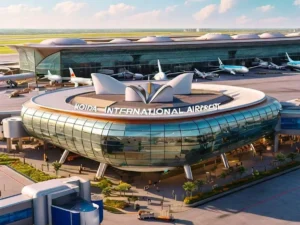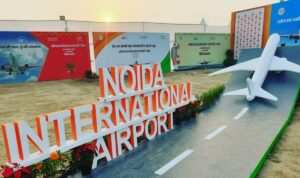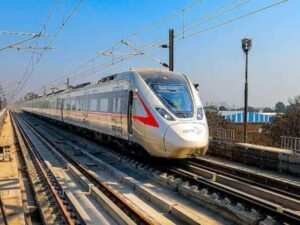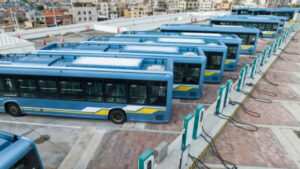The Yamuna Expressway Industrial Development Authority (YEIDA) has initiated plans to acquire approximately 3,690 hectares of land from villages near Noida International Airport. The aim is to develop a 16-kilometer dedicated freight corridor that will link the airport with the Delhi-Howrah rail line and new industrial sectors. This move is part of a broader strategy to bolster infrastructure around Noida’s upcoming airport, positioning the area as a vital logistics and industrial hub.
Overview of the Freight Corridor Plan
YEIDA’s acquisition plan targets a key industrial belt near Bulandshahr, incorporating 55 villages into the Master Plan 2041. This project emphasizes the construction of:
- A 16 km freight corridor that will connect the airport to the Delhi-Howrah main rail line near Chola station, and extend to other key transportation routes, including the Eastern Freight Corridor.
- 13 new industrial sectors, primarily focused on logistics and warehousing, ensuring that businesses near Noida can seamlessly integrate airport services with rail and road infrastructure.
- A 100-meter-wide road that will serve as a vital commuter route along the industrial cluster, enhancing transportation convenience for industrial operations and workers.
These industrial areas will be primarily utilized for warehousing and logistical services, ensuring that the region can handle the growing demand for faster freight movement. Additionally, the development will provide opportunities for industries to establish facilities near the airport, taking advantage of enhanced connectivity to major national and international routes.
Key Features of the Freight Corridor
- Integration with Major Rail Lines: The corridor will connect to the Delhi-Howrah main line and further extend to the Delhi-Mumbai freight line near Rundhi station. This network will facilitate seamless goods movement between Noida and major ports, including Kolkata, Amritsar, and Mumbai.
- Enhanced Connectivity: This project aims to improve connections between industrial areas, Noida International Airport (NIA), and other cities. The rail link will enhance the supply chain logistics for industries, ensuring faster delivery of goods.
Long-term Impact on the Region’s Development
The establishment of a freight corridor and industrial zones will significantly contribute to the region’s economic growth. According to YEIDA CEO Arun Vir Singh, this initiative aligns with the broader goal of transforming the area around Noida International Airport into a logistics and industrial hub. The combination of air, rail, and road transportation options positions the region as a crucial node in India’s supply chain network, potentially attracting significant foreign and domestic investments.
Comparison with Other Similar Projects
To offer a broader understanding of the scope and potential impact of YEIDA’s freight corridor development, it is useful to compare this project with other similar developments across India.
| Feature | YEIDA Freight Corridor (Noida) | Delhi-Mumbai Industrial Corridor | Chennai-Bangalore Industrial Corridor | Amritsar-Kolkata Industrial Corridor |
|---|---|---|---|---|
| Main Focus | Airport Freight Corridor & Warehousing | Manufacturing & Freight | IT & Manufacturing | Logistics & Industrial Growth |
| Area Coverage | 3,690 hectares | 1,500 km (Delhi to Mumbai) | 560 km | 1,839 km |
| Connectivity | Delhi-Howrah & Delhi-Mumbai Rail Line | Dedicated Freight Rail Corridor | Road & Rail | Rail Network |
| Industrial Focus | Logistics, Warehousing | Multi-sector (Manufacturing, Logistics) | IT, Electronics | Multi-sector (Logistics, Manufacturing) |
| Completion Timeline | 2024 (Phase I) | 2023 | 2025 | Ongoing |
| Key Advantages | Close proximity to airport and metro | Connects India’s major cities | Proximity to IT hubs | Major freight network across North & East India |
YEIDA’s project stands out due to its proximity to the upcoming Noida International Airport, giving it a significant advantage in terms of logistics and freight handling capabilities. The focus on warehousing ensures that businesses can operate efficiently with quicker access to air transport.
Future Industrial Growth
The freight corridor is just one component of YEIDA’s ambitious plans. The proposed 13 industrial sectors will form a backbone for industries ranging from logistics, warehousing, to potential high-tech manufacturing. These sectors are expected to be equipped with state-of-the-art infrastructure to meet the needs of businesses operating in global supply chains.
In addition, YEIDA has committed to enhancing connectivity with the Dadri-Noida-Ghaziabad Investment Region (DNGIR), creating an extensive industrial ecosystem that would benefit from the superior transportation infrastructure. This will lead to improved business operations, seamless movement of goods, and overall economic development in the region.
Potential for Job Creation and Economic Impact
With the establishment of warehouses and logistics hubs, this initiative is expected to generate thousands of direct and indirect employment opportunities. The freight corridor and industrial sectors will also attract global and domestic companies, bringing in investments that could transform the region into a key player in India’s industrial sector.
The strategic location near Noida International Airport, coupled with rail and road connections, positions the region to support export-oriented industries. This, in turn, could lead to a surge in manufacturing units setting up operations in the area, further boosting economic activity.
Additional Planned Services and Features
YEIDA is also focusing on creating a range of support services for industries in the new sectors. These will include:
- Business parks and office spaces to cater to both industrial and service-based companies.
- Increased public transportation options, ensuring that workers can easily commute to the new industrial zones.
- Advanced digital infrastructure to support operations that rely on real-time logistics tracking and data-driven supply chain management.
The development will prioritize sustainability, with green spaces, rainwater harvesting, and energy-efficient infrastructure being key elements of the industrial sectors.
Frequently Asked Questions (FAQs)
- What is the purpose of the YEIDA freight corridor? The YEIDA freight corridor aims to connect Noida International Airport with major national rail lines and new industrial sectors, facilitating faster and more efficient goods movement.
- When is the project expected to be completed? The initial phases of the project, including land acquisition, are expected to be completed by 2024.
- What industries will benefit from this project? Industries involved in logistics, warehousing, manufacturing, and export-oriented businesses are expected to benefit from the enhanced connectivity.
- How will this project impact local communities? The acquisition of land for the freight corridor will bring new employment opportunities and infrastructure development to local communities around Bulandshahr.
- How does this project compare to other freight corridors in India? Compared to other projects like the Delhi-Mumbai Industrial Corridor, YEIDA’s freight corridor is strategically located near an airport, which enhances its potential as a logistics hub.
Conclusion
The acquisition of land for YEIDA’s freight corridor marks a major step towards transforming the region into a key industrial and logistics hub in northern India. By improving connectivity between Noida International Airport and major rail networks, the project promises to attract significant investments and spur economic growth in the region. With 13 industrial sectors dedicated to logistics and warehousing, businesses will benefit from modern infrastructure and improved access to national and international markets.







